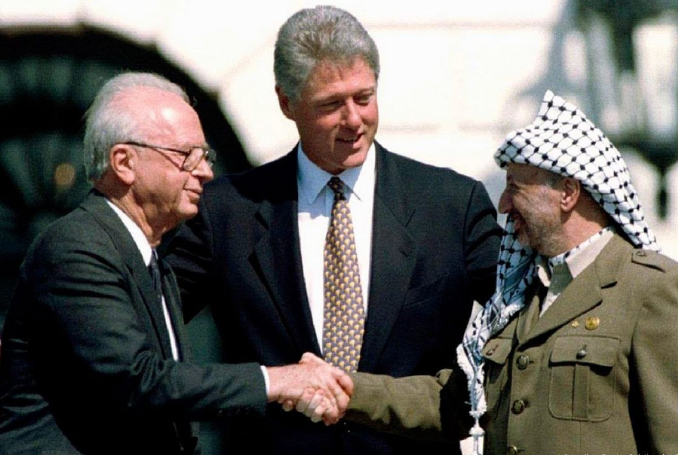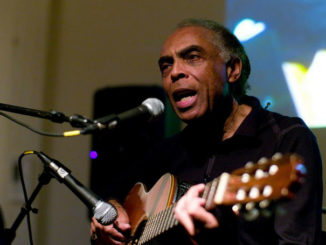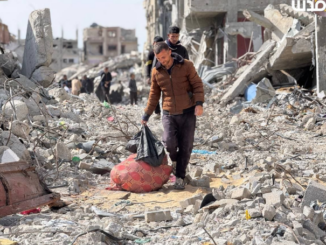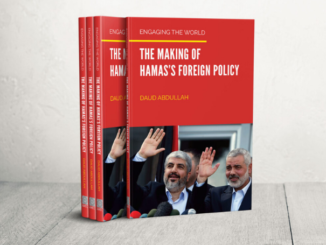
By Omar Zahzah
“It’s classic Fanon, if you think about it,” Palestinian writer Yara Hawari, Senior Analyst of Al-Shabaka: The Palestinian Policy Network, remarked in 2018 about the 25th anniversary Oslo Accords.
“It’s like, Let’s create this class of people that are going to maintain the security of the oppressed or the natives, so that we don’t have to do it.”
The “class” Hawari refers to here is the Palestinian Authority, that repressive, native informant apparatus whose incarceration and brutalization of its own people and total obedience to the Zionist colonial state was institutionalized through the passage of the Oslo Accords in 1993. Hawari relates the formation of the PA to the underdeveloped national middle-class Fanon describes in “The Pitfalls of National Consciousness,” a class that maintains its material integrity and interests by preserving neo-colonial relations and collaborations with the colonial power.
Palestinian activist Jamal Juma explains that through the Accords, the PA made it so that Palestinian livelihoods would be controlled by organizations including the World Bank and the International Monetary Fund, and that the division of the West Bank into areas A, B, and C is ultimately guided by a larger strategy of total annexation.
An expansive exploration of the former subject, Toufic Haddad’s Palestine, Ltd. demonstrates how Western donor states and financial institutions used the Oslo Accords as a test-case in the exploration of national and governmental forms of arrangement that could be most agreeable to neoliberal capitalist ventures—an insight that suggests how Palestine operates as a “lab” in ways other than the more familiar discussion of the Zionist state honing the weaponry, crowd-control and surveillance tactics that it will eventually export to other nations and corporations upon Palestinian bodies and territories.
Yet as crucial as these insights are, they are tied to the material components of the Oslo Accords’ disastrous impacts.
I believe it’s also important to discuss other, more abstract components of the Accords’ destructiveness—components that are not even limited to Palestine alone. Such an undertaking is important, as every attempt to diagnose the true colonial character of our condition brings us one step closer to a potentially liberated–and liberatory–consciousness.
Emotional and Mental Reproduction
The physical character of colonial projects may reproduce itself emotionally and mentally, both within the collective morale of the colonized as well as in the minds and hearts of individuals among colonized populations. Thus, it takes no great leap of the imagination to consider that the physical and political fragmentation wrought by the Oslo Accords—the arrogant and arbitrary declaration that a future Palestinian state would only concern those Palestinians presently within colonized and militarily occupied Palestinian territory; the abandonment of the liberation struggle; the creation of a corrupt Palestinian bourgeoisie elite that would profit directly off of oppressing and exploiting its own people–have also reinscribed themselves within the individual Palestinian psyche.
It also stands to reason that such a reinscription would have profound effects not only upon individual Palestinian morale, but the activism (and here I deploy this term intentionally) that followed in the wake of the Oslo Accords.
My subject of analysis is a particular type of activism (again, used here to describe a mindset and various forms of prioritization) that values the individual reputation, ego, “brand,” politics, over, or at the complete exclusion of, the larger liberation struggle as well as the need for mutual and collective struggle among our people. One person or organization becomes the default representative of the Palestinian cause, and rather than seeing others involved in the same struggle as comrades, all become competitors in a cheap struggle for “authenticity.”
Collectivity shifts from a strength to a liability, as the plurality of voices and approaches so integral to the health of any veritable liberation movement becomes crowded out by the cultural lure of being the default Palestinian voice, the Palestinian activist, the Palestinian intellectual, and so on, as opposed to one among many.
Anti-colonial criticality becomes redirected towards liberal policy analysis and so-called “thought leadership” that takes for granted and even benefits from the perseverance of structures and systems that need to be destroyed rather than sustained. But even a more critical posture is not necessarily indicative of having transcended this status quo, as being the most radical presence can become commodified as its own, cynical show of competition.
It is no longer the Palestinian struggle that is engaged, in its entirety and contradictions, but a sanitized version that is repackaged and sold to a target audience. The fragmentation imposed upon our struggle by our colonizers and the so-called leadership among our people that willfully collaborate with them for their own personal gain is restaged in this competition, and fragmentation itself becomes incentivized rather than challenged.
All oppositional forces, from our colonizers to their imperialist allies, would like nothing more than for us to remain scattered, to remain fragmented, so it is natural that we would find ourselves in systems and situations where attacking one another as a way of building ourselves up is encouraged, however indirectly.
What is Meant By Social Economy
An “economy” typically implies a system of relation and exchange. Thus to refer to the phenomenon in question as a “social economy” might seem a strange choice of words. But through this formulation we are considering the ways in which social relations themselves are conditioned by economic processes—the way, for example, personal and professional relationships become distorted by capitalistic notions of profit, productivity, and artificial scarcity, or how neoliberal belief systems encourage a “buffet” style approach to issues of oppression that says holding a marginalized identity in and of itself entails liberatory intentions (Mahmoud Abbas should be a sufficient enough refutation of this regressive political tendency.)
In our example, political work becomes imperceptibly overtaken by for-profit incentives of competition, false scarcity, and exclusion, and a cause that is at heart a collective struggle for anti-colonial liberation becomes nothing more than a means of self-promotion and advancement. To the extent that rampant NGOization both in Palestine and internationally diverts liberation-focused efforts to reformist ones sharply limited by strings-attached funding and siphons the intellect and creativity of organizers into bureaucratic demands such as fundraising and donor relationship building, we cannot ignore the interplay between compromised institutions, predatory economic subjugation, and political mercurialness.
Good Faith and the Unconscious
However, while such engagement may at times be informed by a willful disregard, our experiences suggest that such a state of affairs is more likely to be reinforced unconsciously. Thus, even in the most intense moments of seeming competition and disagreement, the possibility of good faith should always be presumed.
One imperfect yet nevertheless amelioratory practice given this state of affairs is to insist upon intentional and conscientious distinctions between the grassroots and non-profit spheres. To be sure, there is overlap, but to consciously present non-profits as the grassroots would ultimately water down grassroots work with the demands, limitations, and restrictions of non-profit bureaucracy.
In the interim to the complete dissolution to the non-profit system, one important approach is to navigate non-profit spaces with an awareness of these material distinctions and always ask oneself (and one’s organization(s)) how best to utilize the resources and networks of the non-profit milieu to amplify the grassroots without restriction whenever possible.
It would be a far simpler task if the Oslo Accords had resulted in a generation of self-interested activists and organizations competitively profiting off of their Palestinian “brands,” for better or worse, but this is not what I’m arguing. The reality is murkier, and more difficult to define, but ultimately what I’m suggesting is that various factors, including the overemphasis on the individual within settler-colonial/capitalist US nationalist ethos, as well as the myriad forms of fragmentation inflicted upon us through the Oslo Accords, are themselves internalized and re-staged within US activist scenes, but often at the level of general instinct and impression.
Various social and symbolic norms make it so that certain actions and attitudes are simply felt to come more naturally than others. This is the case with capitalism in general, which presents a complete distortion of social relations and attachments as so-called “reality,” “nature,” “society,” and so on. Our colonial condition, while in some ways more particular, nevertheless operates with similar effect: the horizon of possibility is increasingly depleted by shrinking borders and an abdication of responsibility and dedication to the struggle.
The Way(s) Forward
There is no one set “solution” to such a state of affairs, but as individualism and competition are the scourges, approaches that center collaboration and mutual uplift obviously should be prioritized. To that extent, continually engaging in (and presuming) good faith from others—with the exception of crossing red lines about Zionism and normalization—should be standardized. But even when it comes to these red lines, it is crucial to be able to name exhaustive standards for Zionism and normalization, as well as to establish and maintain cultures of principled political commitment.
At this point, it ought to be far from politically controversial to say that the Zionist entity has no right to exist, should never have existed and in fact, should not exist even now; that Palestinians have the right to all forms of resistance until total return and liberation, and that all of the Zionist entity is, in fact, occupied Palestine, an alien construction upon stolen land and lives that needs to be destroyed in the lead-up to comprehensive Palestinian liberation and reparations.
Explicitly naming competitions and turf wars as reflective of the Oslo Accords rather than feeding into them can at times aid in refocusing efforts towards the larger struggle and collective betterment, though this is not always a guarantee.
At the root of the issue is the need to operate with a sense of Movement rather than individualism or activism, and always begin from a position of helping the collective cause rather than advancing individual gains. The struggle is hurt by our fragmentation, though it’s important to resist the cynical cooptation of this principle as a means of encouraging tolerance of any and all political lines within our spaces and wider networks (such as normalization of the Zionist entity, including acceptance of the Palestinian “Authority’s” security coordination).
For the purpose is to rekindle and preserve a sense of collective identity and resistance that operates within a genuinely anti-colonial frame, rather than accepting our colonization as an inevitability, or even past event.

– Omar Zahzah is a writer, poet, organizer, and Assistant Professor of Arab and Muslim Ethnicities and Diasporas (AMED) Studies at San Francisco State University. Omar’s book, Terms of Servitude: Zionism, Silicon Valley, and Digital/Settler-Colonialism in the Palestinian Liberation Struggle is forthcoming from The Censored Press in Fall 2025. He contributed this article to The Palestine Chronicle.







